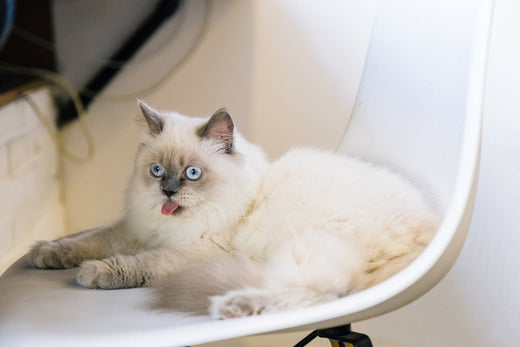Introduction
Kidney stones, also known as renal calculi, are a prevalent and often excruciating condition that can affect cats of all ages and breeds. These mineral-based formations can develop in the kidneys and, if left untreated, result in serious health complications. In this article, we will explore the dynamics of kidney stones in cats, with a specific emphasis on the connection between this condition and vitamins, minerals, supplements, and diet. Comprehending the role of nutrition in feline kidney health is essential for both the prevention and management of kidney stones.
Types of Kidney Stones in Cats
Before digging into the complexities of nutrition and its impact on feline kidney health, it's vital to understand the different types of kidney stones that can affect cats. The two primary types are:
-
Struvite Stones: They usually appear in urine that is alkaline and may result from urinary tract infections or diets that promote alkalinity.
-
Calcium Oxalate Stones: Calcium oxalate stones are another prevalent type of feline kidney stones. They tend to form in acidic urine and may be associated with dietary factors and metabolic abnormalities.
The Role of Nutrition in Preventing Struvite Stones
Cats who consume a balanced diet are less likely to develop struvite stones in cats. The objective is to create a milieu in the urinary tract that inhibits the formation of these crystals. Here are essential dietary considerations:
-
Moisture-Rich Diets: Ensuring that cats receive a suitable amount of moisture in their diet is crucial for averting struvite stones. Wet or canned cat food is beneficial in this regard, as it contributes to increased water consumption, promoting the dilution of urine.
-
PH-Balanced Diets: Maintaining the pH balance of a cat's urine is vital for preventing struvite stone formation. Diets that promote slightly acidic to neutral pH levels can help avoid the crystallization of magnesium ammonium phosphate.
-
Limited Magnesium Intake: Magnesium is a component of struvite crystals, and reducing its intake in the diet can be a preventive measure. For cats who are susceptible to struvite stones formation, it’s imperative to choose meals with regulated magnesium levels.
-
Cranberry Supplements: While more research is needed, some studies suggest that cranberry supplements may help prevent urinary tract infections, which can contribute to struvite stone formation. These supplements may create an environment that discourages bacterial growth in the urinary tract.
The Role of Nutrition in Preventing Calcium Oxalate Stones
Preventing the formation of calcium oxalate stones involves dietary measures that address the factors contributing to their development. Here are key considerations:
-
Calcium Balance: Contrary to struvite stones, calcium oxalate stones are more likely to form in acidic urine. Retaining an appropriate ratio of calcium in the diet is crucial to stop excessive oxalate absorption, which can lead to stone development.
-
Reduced Oxalate-Rich Foods: Some cat foods may contain a high content of oxalate, contributing to stone formation. Foods such as beets, nuts, and certain veggies should be limited in the diet of cats prone to calcium oxalate stones.
-
Adequate Hydration: It’s necessary to drink enough water to prevent calcium oxalate stones. Encouraging cats to drink more water or including wet food in their diet can contribute to increased urine volume and dilution of substances that lead to stone formation.
-
Monitoring Sodium Intake: High sodium levels in the diet can increase the excretion of calcium in the urine, potentially leading to calcium oxalate stone formation. Monitoring sodium intake, particularly in cats who are at risk of this type of stone, is advisable.
The Role of Supplements in Feline Kidney Health
While a well-balanced and customized diet is fundamental in averting kidney stones, several supplements may offer additional support to maintain overall kidney health in cats. However, it's important to consult with a veterinarian before introducing any supplements into a cat's routine. Some supplements that may be considered include:
-
Potassium Citrate: This dietary supplement can change the acidity of urine, making it less conducive to the formation of certain types of kidney stones.
-
Probiotics: Probiotics tend to maintain a healthy gut microbiota, which may have an impact on the overall health of the urinary tract. While more research is needed, maintaining gut health may indirectly support kidney function.
Dietary Management for Cats with Kidney Stones
In cases where a cat has already developed kidney stones, dietary management becomes a crucial aspect of treatment and prevention of recurrence. Veterinarians may recommend specialized diets tailored to the type of stones present. Some common dietary approaches include:
-
Prescription Diets: Certain commercial cat foods are framed to dissolve specific kinds of stones or crystals. These prescription diets are typically low in certain minerals that contribute to stone formation.
-
Hydrolyzed Protein Diets: For cats with a history of struvite stones, diets with hydrolyzed proteins may be recommended. By breaking down into smaller, easier-to-digest parts, these proteins lessen the chance of forming crystals.
-
Increased Water Intake: Encouraging increased water intake is crucial for cats with kidney stones. This can be achieved through wet or canned food, water fountains, or the addition of water to dry food.
-
Regular Monitoring: Cats with a history of kidney stones require regular veterinary check-ups and monitoring. Periodic urine analysis can help detect any signs of crystal formation or changes in kidney function.
-
Weight Management: Maintaining a healthy weight is crucial for preventing various health issues, including kidney stones. Obesity can contribute to metabolic imbalances that may increase the risk of stone formation.
Conclusion
Kidney stones in cats are a challenging health issue that requires a multifaceted approach, with nutrition playing a pivotal role. By understanding the specific dietary needs of cats prone to kidney stones, cat owners can take proactive steps to prevent stone formation and support overall kidney health. Remember that any dietary changes or supplementation should be done under the guidance of a veterinarian, who can provide tailored recommendations based on the individual needs of the cat. With the right nutritional approach and Everfur's commitment, cat owners can contribute to the well-being and longevity of their feline companions.
References:
https://todaysveterinarypractice.com/wp-content/uploads/sites/4/2016/06/T1509F01.pdf
https://journals.sagepub.com/doi/full/10.1177/1098612X19862084
https://www.researchgate.net/publication/352125563_Nutrition_and_Kidney_Stone_Disease
https://journals.sagepub.com/doi/pdf/10.1177/1098612X16660442










